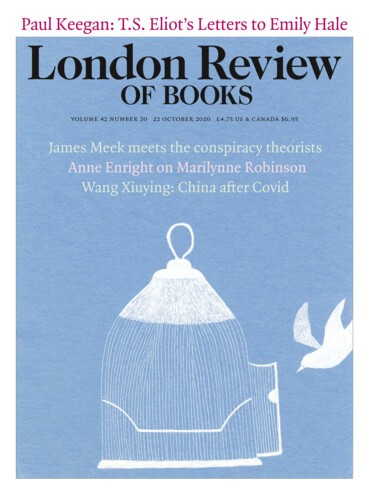Last week, Egypt’s National Security Agency made a series of arrests targeting the country’s leading human rights organisation, the Egyptian Initiative for Personal Rights. On 15 November, there was a night raid on the home of the EIPR’s administrative director, Mohamed El Basheer. On 18 November, Karim Ennarah, a researcher, was taken from the beach-front in the town of Dahab, where he was on holiday. EIPR’s director, Gasser Abdel Razek, was arrested the following day at his home in Cairo. His lawyers say his head was shaved and he was kept in solitary confinement with only a metal bed to sleep on.
Tom Stevenson
Tom Stevenson is a contributing editor at the LRB. His collection of essays, Someone Else’s Empire: British Illusions and American Hegemony, many of which first appeared in the paper, was published in 2023.
Trump was often derided as an isolationist by the imperial bureaucracy, for whom the term is a stock insult. His opponents liked to say he was tearing down the US-led ‘liberal international order’. In the Washington Post, Josh Rogin wrote that Biden held the promise of salvation from the Trump days: ‘a return to a bipartisan, internationalist foreign policy that moderate Republicans and Democrats have long championed’. In fact the Trump administration’s foreign policy was more orthodox than is generally admitted. Many of his appointees were old regime hands. Having pledged to ‘get out of foreign wars’, he did nothing of the sort. He pursued the global assassination programme established under Obama. The US-backed war in Yemen, begun while Biden was vice president, continued. The military budget increased.
In the Grey Zone: Proxy Warfare
Tom Stevenson, 22 October 2020
That proxy wars are essentially anti-democratic goes some way to explaining the adoption of a proxy doctrine, traditionally the preserve of the intelligence services, by the conventional US military. Proxy warfare is officially condemned in Washington and London as a device of undemocratic enemies, but it is precisely for its anti-democratic possibilities that the West embraces it. For US allies, rejection of proxy warfare would be a contradiction. At the strategic level, the British armed forces and the armed forces of Australia and Canada have no discernible vision beyond serving as adjuncts to US power. Which in a sense makes them proxy forces too. The armies of many small states are available to the US as proxies under the justification of fighting ‘terrorism’, controlling ‘ungoverned spaces’ and other phantoms. The new model of local proxy ground troops backed by air power, global surveillance and special operations forces has become a fixture of the times. For political leaders, it’s tempting to see this type of military action as the Goldilocks option: neither the heat of full-scale war nor the cool of unmanly indifference.
The US had other ideas: The Pipeline Project
Tom Stevenson, 10 September 2020
Western Europe – rich, populous, highly developed – has always been short of natural resources. The consequences have been felt by better endowed but poorer societies elsewhere for at least five hundred years. The industrial centres in the Seine-Loire basin, the Po valley, the Bavarian Danube and the Rhine-Ruhr metropolis require a constant supply of hydrocarbons that...
For around a year, the Royal Navy has been drip-feeding news about the reorganisation of the Royal Marine Corps into what it calls a ‘Future Commando Force’. The programme has been widely reported in the national papers as the creation of a ‘lethal new unit’. At the end of June, the navy announced that the marines were getting new uniforms, which the Times described as ‘hi-tech’ because the material includes a small amount of spandex. In one promotional video a marine walks through smoke wearing night vision goggles and looking like one of the sand people from Star Wars.
Podcasts & Videos
Weapons of War
Tom Stevenson and Thomas Jones
Tom Stevenson talks to Thomas Jones about the situation in Ukraine, the effectiveness of some of the weapons in use, from anti-tank missiles to economic sanctions, and the risk of nuclear escalation.
Read anywhere with the London Review of Books app, available now from the App Store for Apple devices, Google Play for Android devices and Amazon for your Kindle Fire.
Sign up to our newsletter
For highlights from the latest issue, our archive and the blog, as well as news, events and exclusive promotions.



